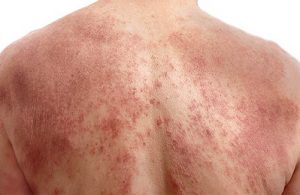For those who are living with atopic dermatitis, commonly known as eczema, it’s not always fun.
Imagine that one minute you’re going on about your day, then suddenly your skin flares into an itchy, dry and blistering rash. The skin irritation becomes agonizing as soon as you start to feel your skin throb and burn, almost as if a million fire ants endlessly crawl all over your skin.
According to the Canadian Dermatology Association, this is what 17 percent of Canadians deal with throughout their lives.

Source: flickr.com
The video below summarizes on eczema and provides further detail on its condition:
Source: Medical Centric (Youtube)
Recent Research
A recent study published in the Journal of Investigative Dermatology examined the relationship between an enzyme (a protein that increases metabolic reaction rates) known as Granzyme B and the symptoms associated with eczema. According to Dr. David Granville, UBC’s Faculty of Medicine professor and researcher, increased Granzyme B secretion causes the enzymes to “eat away” cell-adhesion proteins that function in holding skin cells together. As a result, the skin barrier is weakened which increases skin sensitivity, thereby introducing symptoms like skin inflammation, dryness and itchiness.
So what would happen if these enzyme levels were decreased?
Granville and his team discovered that by lowering Granzyme B secretion levels with inhibitors, skin cell layers were more likely to remain intact as fewer cell-adhesion proteins were eaten by these enzymes. Symptoms such as inflammation and lesion growth were shown to be greatly reduced compared to such increasing symptoms associated with high Granzyme B secretion levels. As these observed symptoms contribute to dryness and itchiness, these findings ultimately introduces a newer approach towards treating eczema.
A Step Closer to Newer Treatments
How can these findings be implemented into future treatments for individuals who have eczema?
Former UBC postdoctoral fellow and lead author of the study Dr. Chris Turner, suggests that with further research and clinical trials, these findings can potentially introduce topical creams or lotions that can inhibit Granzyme B levels in the future, ultimately reducing symptoms of itchiness and inflammation on affected skin. This potentially brings in treatments that avoid damaging the skin such as corticosteroid creams – a common topical steroid cream applied on the skin to reduce eczema symptoms.
“Corticosteroid creams are a common treatment for individuals with AD who experience more severe itching and rashes. However, these can thin the skin when used over a prolonged period of time, which can make skin more prone to damage and infection.” VCH Research Institute, 2020.

Source: med.ubc.ca
As further research opens up more information about eczema and the enzyme that aggravates its symptoms, hopefully it’ll help researchers get closer towards developing potential treatments. Perhaps one day a Granzyme B-inhibiting cream will become available in the market.
After all, no one likes to have itchy, dry skin.
– Tina Huynh
Reference:
Turner, Christopher T., et al. “Granzyme B Contributes to barrier dysfunction in oxazolone-induced skin inflammation through E-Cadherin and FLG cleavage.” Journal of Investigative Dermatology 141.1 (2021): 36-47.
